Boston Terrier
Showing 17–32 of 33 results
Temperament
The Boston Terrier is a happy-go-lucky and outgoing breed. They’re eager to make friends, and will turn their charms toward anyone they come across. With their family, they are affectionate and playful, and develop strong bonds with all members of the household. More reserved or shy dogs can become overwhelmed by the Boston Terrier’s overflowing enthusiasm. This may be the main point of conflict with other pets, as the Boston Terrier is almost never aggressive or mean towards strangers or other dogs. Boston Terriers love to be the life of the party, but that doesn’t mean they can’t relax from time to time. They value their human family members’ attention the most, and will happily snuggle in bed with you. While they will want to be by your side almost all of the time, they aren’t pushy or demanding when it comes to play and attention. Well-bred and properly socialized Boston Terriers will be friendly and engaging with almost anyone, but will also be able to entertain themselves when the situation calls for it. However, that doesn’t mean they can be left alone for long periods, and they’ll still require the company of their owner or family members.-
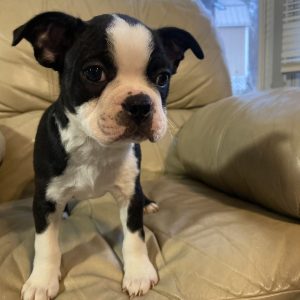
Boston terrier puppy
-

Boston terrier puppy
-
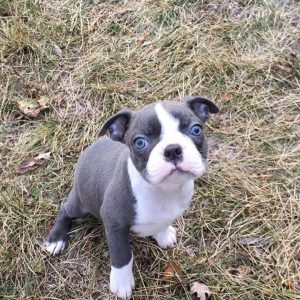
BOSTON TERRIER PUPPY FOR SALE
-
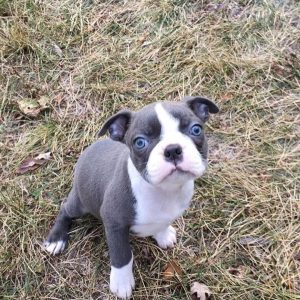
BOSTON TERRIER PUPPY FOR SALE
-

Boston Terrier_Blue
-

Boston Terrier_Blue
-
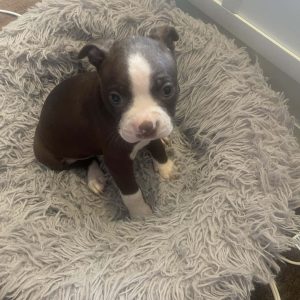
Boston Terriers ckc
-

Chunky Boston terrier puppies
-

Chunky Boston terrier puppies
-
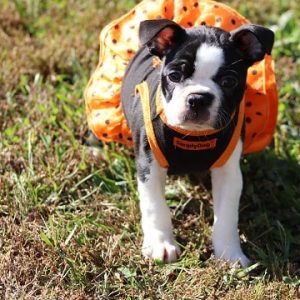
CKC & APRI Boston Terrier Puppies !
-

Dorothy Black Boston terrier
-
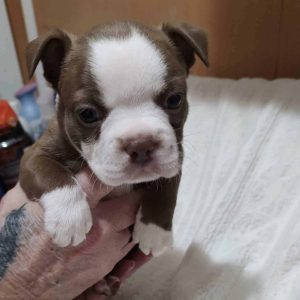
Greyson in gray-collar a Valentine baby male
-

Hollie – Amazing F Tx
-

Males Noah – blue collar & Snickers -red collar
-
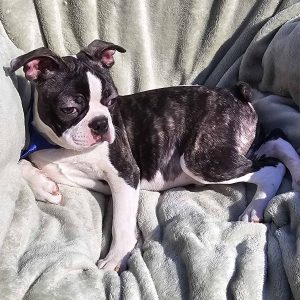
Silas
-

Splash Boston Terrier puppies
The Ultimate Guide to Boston Terrier
Origins
Their name implies some connection to the city of Boston, and that’s technically true. But the origins of the Boston Terrier can be traced back to Liverpool, England. In the latter half of the 19th century, underground blood sports were in full swing, and it is theorized that breeders crossed the Bulldog and the English Terrier to create an ideal pit-fighting dog. This dog would be fast, powerful, and small, perfect for ratting contests. One of these dogs from Liverpool was sold to an American, who in turn sold the dog to a man in Boston. This dog was named Judge, and he would become the ancestor of all modern Boston Terriers. The breeder club for the Boston Terrier named them so to avoid conflict with other bull terrier and bulldog clubs, which turned out to be a good move. The Boston Terrier quickly became well-known, at one point becoming the most popular dog in the country. Today the Boston Terrier is still one of America’s favorite dogs, and is still actually the official dog of Massachusetts.
Key Characteristics of Boston Terrier
| Boston Terrier | The Boston Terrier is a happy-go-lucky and outgoing breed. They’re eager to make friends, and will turn their charms toward anyone they come across. With their family, they are affectionate and playful, and develop strong bonds with all members of the household.
More reserved or shy dogs can become overwhelmed by the Boston Terrier’s overflowing enthusiasm. This may be the main point of conflict with other pets, as the Boston Terrier is almost never aggressive or mean towards strangers or other dogs.
Boston Terriers love to be the life of the party, but that doesn’t mean they can’t relax from time to time. They value their human family members’ attention the most, and will happily snuggle in bed with you. While they will want to be by your side almost all of the time, they aren’t pushy or demanding when it comes to play and attention.
Well-bred and properly socialized Boston Terriers will be friendly and engaging with almost anyone, but will also be able to entertain themselves when the situation calls for it. However, that doesn’t mean they can be left alone for long periods, and they’ll still require the company of their owner or family members. |
| Exercise Needs | While Boston Terriers are lively and playful, they only have moderate exercise needs that can easily be fulfilled with a couple of easy-paced walks a day. Half an hour to an hour of low to moderate intensity exercise is usually sufficient for most Boston Terriers.
Like other flat-faced dog breeds, they don’t have a great deal of stamina and should be monitored for breathing problems during exercise. The structure of their snout also makes it difficult for them to cool down, and Boston Terriers may be prone to heat exhaustion. Take care when bringing your Boston Terrier outside during the summer or in hot weather, or restrict exercise time to the cooler parts of the day. |
| Boston Terrier Grooming | Boston Terriers are usually easy to groom and care for, as they have a short coat that only sheds a little throughout the year. Brushing once a week will help keep your Boston Terrier’s coat healthy and shiny, while also minimizing the shedding. A medium-bristle brush or glove can be used.
They are also not particularly smelly dogs, so bathing does not need to be done very often. Baths once a month or every other month is typical for most Boston Terriers, unless the dog has gotten dirty because of outdoor play.
A Boston Terrier’s face should be wiped everyday as they may be prone to bacterial infections in the folds on their faces. Because their eyes are so large and protrude out of their faces, you should check their eyes for any irritation or redness during these sessions.
It’s recommended to brush your dog’s teeth daily, or at least every other day to prevent tooth and gum diseases. Nail trimming can be done once or twice a month, depending on how much your dog wears down their nails. |
| Boston Terrier Training | Boston Terriers tend to be smart, curious dogs that are excited to explore and learn. They are also born people pleasers, and want nothing more than the praise and affection of their owners and family members. However, their high intelligence can make them think that they know better than their training. Despite that, they take to training very quickly, provided they have the proper motivation.
Harsh treatment or punishments are ineffective with Boston Terriers. It’s much easier to train them with positive reinforcement in the form of treats, praise, or play. If you can give your Boston Terrier consistent, fun, and varied training, they’ll pick up on it and proudly display the fruits of their training whenever it will get them the most attention. |
| Boston Terrier Lifespan And Health Issues | Boston Terriers typically have a lifespan of 11 to 14 years. Boston Terriers may be prone to:
|
| Boston Terrier Size And Space Requirements | Boston Terriers are a small breed, and don’t take up too much space. They usually stand between 15 to 17 inches tall, and weigh between 15 to 25 pounds. There’s little size and weight difference between males and females.
They are well-suited to living in almost any household, whether small or large, or in any type of setting. Boston Terriers in city apartments will simply need to be brought outdoors for some light exercise, just like Boston Terriers in rural homesteads.
They make wonderful family dogs, and mesh well with almost any number of family members. Close contact with their chosen humans will be crucial for the mental and physical health of this breed, and they should not be kept as outdoor pets – they simply aren’t built for it. |
Other considerations:
- Boston Terriers can be prone to snorting and drooling, much like other flat-faced dog breeds.
- Boston Terriers are not usually very vocal dogs, but are good watchdogs and will alert you when someone enters their territory.
- Some Boston Terriers have been successfully trained as therapy dogs.
How can I take good care of my Boston Terrier or Puppy?
Proper socialization
While Boston Terrier puppies are not prone to any specific behavioral problems, it’s still a good idea to socialize them as soon as you bring them home. Most puppies will be released by breeders to new owners at the 8-week mark, a crucial time in any dog’s life when they are most receptive to new stimuli. This is when they begin learning about the world around them, and the experiences they have will have a great impact on their personality and temperament.
Proper nutrition
Boston Terrier puppies should be fed high-quality, premium dog food so that they develop properly. Since Boston Terriers are prone to weight gain, weighing out your puppy’s meals is advisable. Multiple small meals per day will help prevent overeating and indigestion. Contact your veterinarian for more specific recommendations regarding your Boston Terrier’s nutritional needs, as they may give you advice based on your particular dog’s energy levels, metabolism, or health concerns.
Up-to-date vaccinations
The Boston Terrier, like most other dogs, will complete their initial vaccinations at around 14 to 16 weeks old. Before this, it is important to follow your veterinarian’s instructions regarding the dog’s vaccination schedule and restrictions for interaction. Up-to-date vaccinations are vital to protect your Boston Terrier puppy from common transmissible dog diseases and bacteria.
Most Asked Boston Terrier Questions
-
+How Much do Boston Terrier Puppies Cost